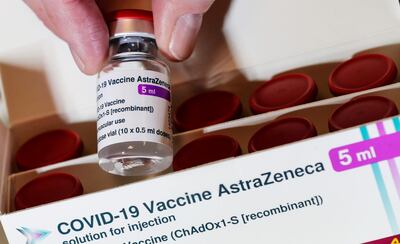EU's medicine regulator is "firmly convinced" there is no evidence that the AstraZeneca Covid-19 vaccine is linked to blood clots after more than 20 countries suspended the use of the drug over safety fears.
The benefits of the vaccine outweigh potential risks, the regulator said on Tuesday.
The suspensions provoked a debate over whether it was prudent to put AstraZeneca inoculations on hold just as vaccination campaigns were beginning to gather pace.
Experts at both the World Health Organisation and the European Medicines Agency (EMA) met on Tuesday to discuss the vaccine, with the European organisation expected to publish conclusions on Thursday.
While millions of doses of the vaccine developed with Oxford University have been administered, small numbers of people have developed blood clots, prompting countries including the EU's three largest nations – Germany, France and Italy – to suspend injections.
The EMA insisted that countries should continue using the vaccine.
"We are still firmly convinced that the benefits of the AstraZeneca vaccine in preventing Covid-19 with its associated risk of hospitalisation and death outweigh the risk of these side effects," EMA chief Emer Cooke said on Tuesday.
Ms Cooke, however, said the regulator was "looking at adverse events associated with all vaccines".
France and Italy welcomed the news.
The preliminary statements from the EMA "are encouraging," read a joint statement from French President Emmanuel Macron and Italian Prime Minister Mario Draghi.
The head of Italy’s medicines regulator Nicola Magrini said the decision to suspend the use of AstraZeneca was a “political one”.
French Prime Minister Jean Castex vowed he would be vaccinated "very quickly" with the AstraZeneca vaccine to give public the confidence if it was ruled as safe by the EU medicines agency.
Mr Castex said new restrictions could be put in place for the Paris region, such as the weekend lockdowns already imposed in the Nice and Calais regions.
"We are in a worrying and critical situation and, clearly, measures of the type that have been used in other parts of the territory are on the table," he told BFM TV in a live interview.
In Britain, which has administered more than 11 million AstraZeneca doses, experts see no evidence of more frequent blood clots among the inoculated.
Prime Minister Boris Johnson wrote in The Times newspaper that the shot "is safe and works extremely well".
One British scientist argued that Covid-19 itself – and not the vaccine – could be to blame, as it was known to cause such problems.
The "very likely explanation of at least some of the clotting disorders seen are a result of Covid-19 rather than the vaccine", said Stephen Evans, professor of pharmacoepidemiology at the London School of Hygiene and Tropical Medicine.
"Hence, even if there were a problem, acknowledged to be very rare with the AZ vaccine, the overall benefit would be so much greater than any speculative harm," he said.
Coronavirus deaths across Europe passed the 900,000 mark, making it the worst-hit global region in absolute terms, according to an AFP tally.
In the world's hardest-hit country, the United States, former president Donald Trump encouraged his Republican supporters – one of the main groups saying they are reticent to take Covid-19 vaccines – to get their shots.
"I would recommend it," Mr Trump said in a late Tuesday interview on Fox News.
This was Mr Trump's most explicit endorsement for the national mass vaccination campaign since he left office in January.
Mr Trump and his wife Melania were vaccinated at the White House in January although they did not announce the move at the time.
Global vaccination challenges
More than 382 million doses of vaccine have been administered globally, the vast majority in wealthier countries while many poorer nations have yet to receive a single jab.
AstraZeneca's shot, among the cheapest available, was billed as the vaccine of choice for poorer nations and the clot reports have had an impact beyond Europe.
Countries that have halted or delayed the vaccination range from Indonesia and Venezuela to Sweden and the Netherlands.
But Canadian Prime Minister Justin Trudeau urged people to get the AstraZeneca shot. A scientific committee advising the government even extended its recommendation for AstraZeneca's shot to people aged 65 and over.
Thai Prime Minister Prayuth Chan-o-cha was also injected with the shot as his country lifted its own AstraZeneca suspension.
"I am an example today," he said.
The pandemic spurred unprecedented efforts to develop vaccines, with a number of successful options now available.
On Tuesday, Brussels sealed a deal to step up deliveries of 10 million doses of the Pfizer-BioNTech vaccine, now scheduled to arrive in the EU before July rather than in the third quarter.
And a new agreement for Germany's IDT Biologika to help produce the single-shot Johnson & Johnson vaccine would offer Europe greater certainty, Germany's economy minister said.









